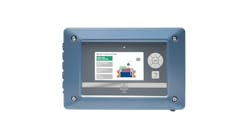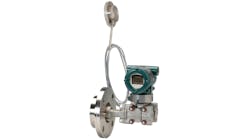Sometimes a level instrument is only as smart as the guy doing the calibration
The first time I ran out of gas was in my 1953 Studebaker coupe. When I was 13 years old, my father bought me the car for $50. Having sat abandoned for years, it had bad and missing paint, no transmission, and an interior ravaged by vermin, but it was a ’53 Loewy coupe, and it was mine. He put it in our suburban backyard, and I went to work. By the time I got my driver’s license, it was completely apart, cleaned and painted, and back together. It took first place, modified division, at the seventh annual Studebaker Drivers Club national meet.
That car and I were very close, and with all I had done for it, I took it personally when it refused to run just because I was in a hurry and couldn’t get gas just then. It was a life lesson, so I was less surprised the only other time it let me down, which was during a high-speed pass of multiple cars on a two-lane highway in Arkansas.
An oncoming car was getting too close, so I went to pull in behind one of my slow-moving passees and discovered that even those big finned drums I had retrofitted from a 1964 Gran Turismo Hawk almost couldn’t haul us down from 90 mph in time to prevent a rear-ending. As I write this, I can smell the burning linings.
Nowadays, despite widespread digitalization, to my knowledge, all cars with gas tanks still have float-actuated rheostatic level sensors, and the dashboard indicators are essentially voltmeters. New ones have low-fuel warning lights and some can even count down the miles to empty. The one in my wife's car is highly accurate—the other day, with an indicated 8 miles left to empty, I put 17.9 gallons in the “18.5 gallon” tank. I call that close enough.
Many people I know won’t let their cars go below half a tank, but I want to stop for gas as seldom as possible, preferably at my favorite station near my home. So, I often push my luck and learn exactly how far down the gauge I can go. As a consequence, I’ve run out of gas every few years, all my life. That's one reason I carry a AAA card, and I know how to use it.
The latest time was just last week, and it also involved a Studebaker—this time, a 1963 Avanti. I recently had the sensor out of the car, and had calibrated it carefully, making sure the gauge read full with the float arm raised to the top, and empty with it just above the floor of the gas tank.
But I stupidly did it with the engine off, at perhaps 12.2 battery volts. With the engine running, the charging system regulates at 14.2 volts, so it reads about 1/8 high. I knew this, but I thought, surely, reading 3/16 of its 20-gallon tank, it would get me to the next service area.
However, with only a few miles to go, the car lost power and we coasted across three lanes of traffic to the right shoulder. Perfectly safe, remember, I have a lot of practice at this.
I noted the mile marker, pulled out my smart phone and called AAA, but for some reason, with the highway number, direction and mile marker, they couldn’t figure out where I was. After a few minutes of back-and-forth and questions I couldn’t answer (Visible landmarks? None, it’s dark. Municipality? Don’t know. Last highway I crossed? I don't recall), I told them I could see an exit up ahead but couldn’t quite make out the sign, so I would just walk up the shoulder a ways and read it. By the time I did that and walked back, a tollway rescue truck had pulled up behind my car, so I told AAA to forget it.
The rescue worker put two gallons in the tank, gave me a form to send back with $10 in a postpaid envelope, and waited while I cranked the engine for too long to refill the float bowls with its mechanical pump. Eventually, the beast fired up, and I was on my way. Total lost time was less than 45 minutes.
When I told this story to my millennial son, he asked, “Why didn’t you look up your location with the phone GPS?” It had never occurred to me because all those times in the past, I didn’t have a smart phone. Hey, I know what I’m doing.

Leaders relevant to this article:


